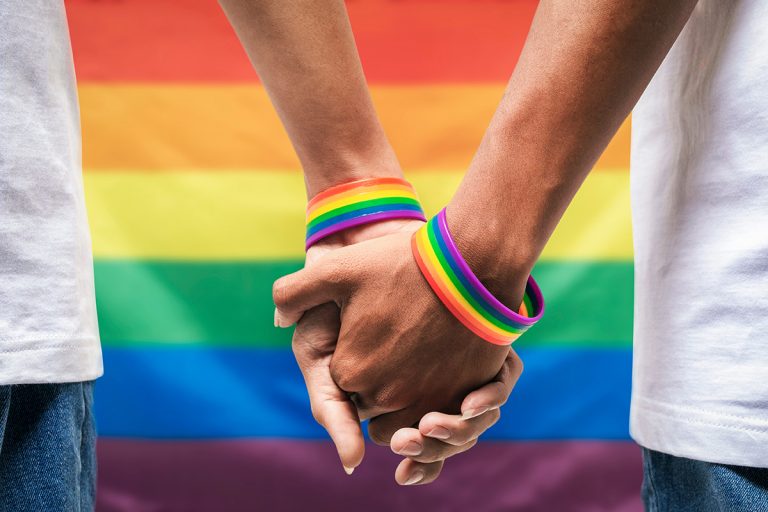Editor’s note: Viristar is pleased to share this post on queer inclusivity in the outdoors, written by Faith Meckley of Women’s Adventure ACT. Women’s Adventure ACT is a non-profit community group that runs outdoor activities for women in the Canberra, Australia area.
Although the original audience was focused on outdoorsy women in the Australian Capital Territory (ACT, around Ngunnawal Country/Canberra), we felt the ideas could be useful to people all over.
We’re thankful to Faith for her gracious permission to reprint her article.

Yes, we are a women’s adventure group, but not all of our members are women!
Women’s Adventure ACT exists for many reasons, but one of the big ones is to provide a safe space for people who frequently experience sexism and other forms of discrimination in outdoor and adventure spaces, primarily from cis* men. The easiest and most straightforward way to do that thus far has been to exclude men from becoming group members.
However, one mistake that Women’s/ “Womxn’s” groups like ours often make is accidentally (or in some cases, intentionally) only making a safe space for cis, straight, white women. If you aren’t familiar with the concept of white feminism vs. intersectional feminism, please take a brief diversion to check out this article in Harper’s Bazaar by author and speaker Rachel Cargle.
Fortunately, our group’s leadership is passionate about inclusivity and making Women’s Adventure ACT a welcoming and safe group for more people, and we like to think our membership is mostly pretty passionate and open to learning, too!
With that in mind, here are some tips from our resident bisexual and queer advocate Faith Meckley for remembering that our group is gender- and sexuality-diverse, and keeping our community inclusive.
*What does cis mean? Cis is shorthand for cisgender, a word used to indicate that you are the gender you were assigned at birth. For example, when you were born, a doctor or someone declared you were a girl, likely based on your genitals, and today you still identify with being a girl/woman. Cisgender is the opposite of transgender, like straight is the opposite of gay.
Language
One place where we all slip up from time to time — often perfectly innocently and without realizing it — is our language.
Women’s Adventure ACT frequently has discussions and events based around all sorts of issues relevant to our members, including: periods, menopause, childbirth, healthcare, pap smears, cervical screenings, abortions, and more.
An important thing to remember is that women don’t actually have a monopoly on these issues, and these issues aren’t necessarily personally relevant to all women! Trans men and non-binary people can also get pregnant, have periods, and need access to abortions and other sexual and reproductive healthcare. Not all women — cis or trans — have uteruses, menstruate, or have the ability to get pregnant.
Here are some examples of how we can change our language to be more neutral and inclusive:
- Instead of “maternity” (maternity leave, maternity ward, maternity clothes) — use “pregnancy”
- Instead of “women’s health,” what kind of healthcare are you actually talking about? Be specific: sexual health, reproductive health, cervical screenings, pap smear, pregnancy, breast cancer, etc.
- See also: “men’s health” vs. prostate exams, prostate cancer, testicular cancer, vasectomies, erectile dysfunction, etc.
- Instead of using “women” to refer broadly to people who have periods, say exactly that instead. Some examples: People who have periods, people who menstruate, people with uteruses, uterus owners.
- As well, when discussing menstruation with people who don’t menstruate, don’t infantilize them or politely skirt around the topic by referring to your period as your “lady time,” or your “womanly thing.” Just call it what it is. Menstruation. Your period. You’re bleeding out of your vag. Oh well, it’s a fact of life, and if they’re grossed out by it, that’s their problem, not yours.
- Instead of “feminine hygiene,” use “period/menstrual products,” or specifically name the product you are discussing (tampon, pad, panty-liner, menstrual cup, period underwear, etc.)
- Abortion is an issue that is often discussed in terms of women’s rights, feminism, or as a women’s issue – but women are not the only people who need access to abortions! And in fact, people who are not women who need abortions often experience more barriers than cis women do in accessing those healthcare services. Consider instead discussing abortion in terms of “reproductive rights,” or taking the time to acknowledge that all genders benefit from having access to abortion when you discuss this topic.
Group activities and pronouns
If you are leading a group event or participating in one, consider introducing yourself with your pronouns. This often encourages other people to follow suit, or makes non-binary, trans, and gender-nonconforming participants feel safer in sharing their pronouns with the group.
How do you do that? Try these:
“Hi, my name is Faith, my pronouns are she her.”
Or
“Hi, my name is Faith, I use she her pronouns.”
As a group leader, you may want to open up introductions like this: “I want to give us all an opportunity to go around and introduce ourselves to each other. If you feel comfortable doing so, I encourage you to share your pronouns as well as your name. I’ll go first. My name is Faith, and my pronouns are she her.”
When listing events on MeetUp (if you have the editorial access to do so) consider adding a “What are your pronouns?” question to give people an opportunity to share ahead of time with the event leader.
Remember when discussing pronouns: they are not “preferred,” they are mandatory! I wouldn’t introduce myself as “Hi, my preferred name is Faith,” (implying you could call me other names if you wanted). Nope, my name is Faith and my pronouns are she/her. End of story.
What does it mean if someone uses multiple pronouns, like she/they, he/she, etc.? Usually, this means that someone likes it when their pronouns are regularly changed up in conversation. If that’s a new concept to you, I encourage you to give this article a read.
One last thing to consider when navigating people’s pronouns is privacy. Some people share their pronouns differently depending on whether they feel safe in a space. As an example, some non-binary people may use they/them pronouns in their personal life and around people they trust. But they may switch back to another set of pronouns, like she/her, in some spaces where they feel less safe, or don’t want to invest emotional energy into explaining or defending themselves, such as professional environments, in new social situations, or at a family dinner with their shitty conservative uncle.
So if you attend a group event with a friend who you know usually goes by they/them, but they introduce themselves with she/her pronouns, that is not the time to pipe up and say, “Hey wait I thought—” And remember, if someone doesn’t take you up on your invite to share their pronouns, there may be another, perfectly good reason for that which has nothing to do with that person being queerphobic.
This concept of privacy also applies to all members of the queer community. Just because someone discloses to you that they are non-binary, or a lesbian, or bisexual, or trans, etc. doesn’t mean that’s public knowledge that’s free for you to share or mention in any social setting. It is always a good idea to have a conversation with your queer friends and ask them in what scenarios they are okay with their identity being shared, if there are any at all.
As an out, loud, proud member of the queer community, even I forget this from time to time, and the fact that not everyone has been as privileged as me to have so many loving and accepting people in my life, along with the ability to drop the people who weren’t like hot potatoes.
How to respond when you f@%$ up
No one’s perfect. We all make mistakes. We all forget things. That’s fine. No one’s asking you to be perfect, and learning and improving is a process.
That said, it’s important to remember that if someone reminds you about inclusive language or pronouns, they’re not saying you’re a bad person. They’re just saying you made a mistake.
Given that, you should respond like you made a mistake — not like you’re a bad person.
Here are a couple of examples of what not to do in a situation that involves someone’s pronouns.
- “Oh, actually I go by they/them pronouns.” “OHMYGOSH SALLY I’M SO SORRY I TOTALLY FORGOT OMG I’M SUCH A TERRIBLE STUPID GALAH OMYGOD PLEASE DON’T HATE ME I HAVEN’T HAD MY COFFEE YET TODAY…”
- “Oh actually, Sally goes by they/them pronouns.” “Ugh, whatever, you get what I mean. That shit is really hard to remember, you know. She’s the only person I know who goes by they/them, oh SEE, look, I did it again. But yeah, it takes a long time to get used to. Anyway, they’re not even here to know I messed up, so who cares.”
Let’s try this instead:
- “Oh, actually, Sally goes by they/them pronouns.” “Oh sorry, thanks for the reminder. Anyway, they were telling me the other day that…”
- “Hey Nora, I told you a while ago that my pronouns are she/they, and I explained to you what that meant, but I’ve only ever heard you call me she. It makes me feel a little invalidated, and I wanted to remind you to use they sometimes, too.” “Oh wow, I’m sorry Charlie. You’re right, I haven’t been very good about that. I’ll do better. Thank you for telling me how you feel and being vulnerable with me.”
I used pronouns as an example here, but this can apply to any situation in which someone is reminding you about inclusive language or introducing you to new information you may not have been aware of.
Allyship is active, not passive — speak up
Marginalized people are putting in exhausting emotional labor every day to create and spread educational resources, to stand up for themselves in their personal lives, and to fight for their legal rights, not to mention the toll it takes on someone’s health to experience discrimination directly.
As allies, we can help carry that burden by speaking up when we see discriminatory language and behavior, whether it’s intentional or unintentional. Yes, even when the people that language and behavior affects aren’t around to hear it. Especially then.
Yes, these situations can be uncomfortable. Yes, people do sometimes overreact and get defensive when they are corrected, and that can be really frustrating to navigate. Yes, you may even occasionally lose a friend over it.
However, it’s important to remember that to be good and effective allies, we’re going to have to get uncomfortable every now and again. If you’ve never been uncomfortable in your role as an ally, the chances are that your allyship has been very superficial so far. Allyship is not about you, it’s about the people you’re trying to be an ally to, and allyship does not exist to make you look good, it exists to make the world a better place for everyone.
As a final note, I would like to stress that this blog post is very much an introduction. Learning, unlearning, and allyship is a life-long process that requires real work. It is never as simple as reading an article or a book and then moving on with your life.
by Faith Meckley



